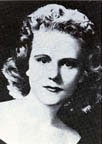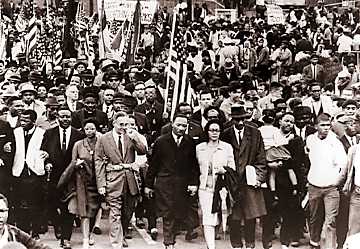
Thousands march to the state capitol in Alabama, led by Dr. Martin Luther King, and his wife Coretta Scott King (center) in March, 1965.
Viola Liuzzo:
True Kindness assassinated
-- the housewife that moved a nation -- . . . a woman ahead of her times . . .
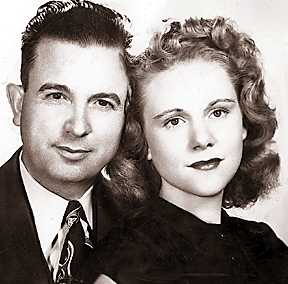 Viola Liuzzo in a 1949 photo.
Viola Liuzzo in a 1949 photo.
|
Viola Fauver Gregg was born in Pennsylvania in 1925. As a child, she lived in Tennessee and Georgia. In 1951, after two previous failed marriages (one at 16 lasted only a day), Viola married Anthony Liuzzo, a Teamster Union official from Detroit. Liuzzo legally adopted Viola's two daughters from her previous marriage and they had three more children. At the age of 36 Viola resumed her education at Wayne State University, and upon graduating with top honors she became a medical lab technician.
After March 7, 1965, many ordinary people, horrified by the televised attacks of state troopers on peaceful marchers at the Edmund Pettus Bridge, went to Selma to add their voices to the cry for justice. One who answered Dr. King's call was Viola Liuzzo, 39, a Detroit housewife mother of five. She left for Selma alone in her car, despite her husband's concerns.
Before, in 1963, civil rights activists had begun an effort to register black voters in Alabama, but hundreds were refused registration at the courthouse in Selma. In February 1965, protests were held to bring attention to this violation of rights, and a small civil rights march ended in the death of Jim Jackson. The civil rights activists then decided to hold a memorial march from Selma to the state capitol in Montgomery on March 7. This first memorial march ended in the massacre viewed by Viola on TV.
A few days later, Martin Luther King and the Southern Christian Leadership Conference (SCLC) won a court order allowing a new restricted march from Selma to Montgomery and directing the state to protect the marchers. Governor Wallace told the White House the state couldn't afford to pay the cost of mobilizing the National Guard for the march, giving President Johnson the opportunity to federalize 1,900 of Alabama's National Guard. The President also authorized the use of 2,000 regular army troops and 200 federal agents to protect the march.
Mrs. Liuzzo actually watched the second march move on to the Alabama Capitol in Montgomery on Thursday, March 25, 1965. She had spent the previous week working at the hospitality desk in Brown Chapel at Selma, and also using her car to ferry people back and forth to Montgomery's airport. The last day of the march in Montgomery she helped in the first-aid station with the worn out marchers or those who had fainted from heat and exertion. Then she and Father Tim Deasy climbed the St. Jude's Catholic Church tower to view the marchers, -who filled the street completely, with no end in sight, heading towards the Capitol. She told Fr. Deasy she had a premonition: "Something is going to happen today, I feel it. Somebody is going to get killed..." She repeated her premonition to another priest and group of nuns.
After King delivered his speech, --"How long will it take? ... Not long, because mine eyes have seen the glory of the coming of the Lord ..."-- the march ended and thousands had to get out of the city. Viola Liuzzo got her car and headed back to Selma with a load of passengers. But her Michigan plates and black passengers made her green Oldsmobile very conspicuous, and the army troops who served as protection were already gone. As soon as their passengers were dropped off in Selma, Viola and Leroy Moton, a black teenager who had been using her car all day as an airport shuttle, headed back toward Montgomery for a second load. After several harassment incidents and on the way out of Selma, they stopped at a traffic light, and another car pulled alongside.
Viola Liuzzo was still full of energy after three long days of shuttling marchers between Montgomery and Selma. A stranger when she arrived in Selma six days earlier, she had become known as a tireless and cheerful voluntary worker.
When the light changed they began chasing the Oldsmobile, careening through the darkened highway for 20 miles at almost 100 mph. While she attempted to outrun her pursuers, she sang at the top of her lungs, "We Shall Overcome." As the Klansmen closed in, a man named Wilkins put his arm out the window. Mrs. Liuzzo turned and looked straight at him and he fired twice through the glass. Another Klansman, William Eaton, emptied his pistol at the car. Then their car sped on away. A man named Eugene Thomas was driving the Klan car.
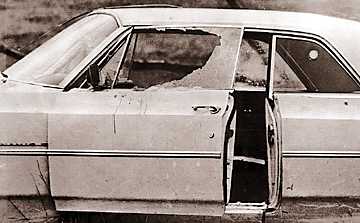 AP Photo
AP PhotoMrs. Liuzzo was killed at the wheel of this car when Klansmen fired at her from a passing vehicle. |
Mrs. Liuzzo fell against the wheel, spattering blood over Moton, who grabbed the steering wheel and hit the brakes. The car turned to the right, crashing down and up through a ditch, being finally stopped by a fence.
After Moton recovered, he left the car and began running down the highway toward Montgomery until he spotted a truck he recognized as belonging to fellow marchers. He climbed in, and told what happened. Mrs. Liuzzo was dead with two shots in the head.
Within 24 hours, President Johnson was on television, personally announcing the arrest of the four assailants and vowing to exterminate the KKK.
A March 28 Detroit News article gave profiles of the four men who were arrested:
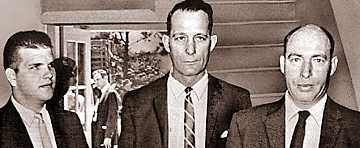 AP Photo
AP PhotoThe three Klansmen charged with killing Mrs. Liuzzo, from left, Collie LeRoy Wilkins Jr., Eugene Thomas, and William Orville Eaton. |
An all-white Alabama jury acquitted Wilkins of the murder of Liuzzo. Since the Klansmen could not be charged with murder in federal courts, Wilkins, Eugene Thomas and Eaton were charged in December 1965 of conspiring to deprive Liuzzo of her civil rights. Gary Rowe, who had been an FBI informer for five years, testified against the three in the federal trial. The three Klansmen were sentenced to 10 years in prison, the maximun then allowed.
Liuzzo's body was returned home to Detroit on March 27, 1965, where her husband Anthony, daughter Penny, l8 and son Thomas, l3 were trying to cope. Viola's sister was caring for the youngest children, Sally, 6 and Anthony Jr., l0. Another daughter, Mrs. Mary Johnson, l7 was on her way to Detroit from Georgia.
The evening before, Anthony Liuzzo talked with President Johnson, who told him the four Klansmen had been arrested and that: "I don't think she died in vain because this is going to be a battle, all out as far as I'm concerned..." Liuzzo thanked Johnson and said: "My wife died for a sacred battle, the rights of humanity. She had one concern and only one in mind. She took a quote from Abraham Lincoln that all men are created equal and that's the way she believed."
Father Deasy paid tribute to her: "I felt very strongly about this woman and her goodness. She inspired us all. Her energy, enthusiasm and compassion were contagious and put many of us to shame. In that vast assembly gathered in Selma from all over the United States, I doubt if anyone equaled her in dedication, in action or in charity toward their fellow man. Mrs. Luizzo died in the service of Almighty God, performing works of charity. Thou shalt love they neighbor as thyself."
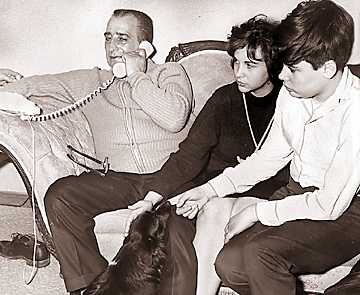
Detroit News Photo
Anthony Liuzzo, left, with daughter Peggy, 18, and son Tom, 13, receive calls of condolence at their home in Detroit.
Epilogue
Viola by all descriptions was an exceptional woman, well ahead of her times. She worked for only a few months before she quit her job as a medical lab technician in protest over the way females secretaries were treated. And with the encouragement of her friend and housekeeper Sara Evans she became one of the few white members of the National Association For the Advancement of Colored People. Evans said of her friend, "Viola lived a life that combined the care of her family and her home with a concern for the world around her. This involvement was not always understood by her friends and others around her."
Unchurched as a child, Viola had converted to Roman Catholicism when she married Liuzzo. Later she joined the First Unitarian Universalist church.
Ugly lies circulated about Mrs. Liuzzo's character. In an attempt to prejudice the case, rumors began to circulate that Viola was a member of the Communist Party, a drug addict, and that she had abandoned her five children in order to have sexual relationships with African Americans involved in the civil rights movement. It was later discovered that these highly damaging stories that appeared in the press had come from the Federal Bureau of Investigations (FBI). The rumors fueled sentiment among some that Mrs. Liuzzo was out of "her place" in Selma, that she should have stayed home with her children. A Ladies Home Journal survey showed that only 26 percent of readers approved of Viola's mission in Selma. Mrs. Liuzzo's friends knew her as a caring person who gave of herself without regard to public opinion, and her children were fiercely proud of their mother.
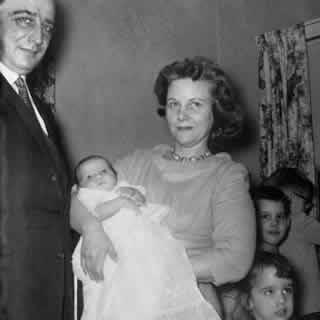 Viola and family.
Viola and family.
|
Daughter Mary said: "We didn't know my mother as a civil rights activist. Her response to the movement just flowed naturally from how she felt about everything. She loved nature, children, adventure, other people -it was all one piece to her ... She questioned and challenged everything."
Daughter Penny said: "Viola had a million interests. She used to take me and my sisters to the symphony and to the art museum downtown, and she went rock collecting and camping with my brothers. She'd always be telling us about what she was studying in college, talking about what was going on in the world, and in the next second she'd be out there rescuing stray animals, feeding the bums and giving them spending money."
In October 1977, the Liuzzo family filed a civil claim against the FBI, charging that Rowe, an FBI employee, had failed to prevent Mrs. Liuzzo's death and may have participated in the slaying. But in May of 1983, a judge rejected the Liuzzo suit, saying there was "no evidence the FBI was in any type of joint venture with Rowe or conspiracy against Mrs. Liuzzo. Rowe's presence in the car was the principal reason why the crime was solved so quickly." Later Rowe was assisted by the Federal Witness Protection Program. He, unlike the Liuzzos and Moton (the other main witness), was financially and physically secure.
The trade union's abandonment of the case, in line with its general abstention from the mass civil rights movement, allowed the forces that helped murder Viola and then slandered her to isolate the Liuzzo family and weaken its legitimate battle to expose and investigate the crime and its perpetrators.
Viola Liuzzo's name is on a Civil Rights Memorial in Montgomery, three blocks from the State Capitol. Memorial stones are also maintained near her home in Detroit and at the place in the highway where she was killed. (Viola Liuzzo Memorial at US Highway 80 Selma to Montgomery)
Viola's dreams were finally made a reality because of her own coward murder, -the sad ending of the historical Selma to Montgomery march of 1965. That August, Congress passed the Voting Rights Act, which guaranteed that every American could exercise the right to register and vote. Her assassins never imagined that her tragic death would bring the needed push for a nation to end its discriminatory ways, to truly end a civil war that had started 100 years before, and to finally resolve that conflict between ideals and reality that had started in 1776 when the Founding Fathers declared: "We hold these truths to be self-evident, that all men are created equal, that they are endowed by their Creator with certain unalienable Rights, that among these are Life, Liberty and the pursuit of Happiness."
This story was compiled using clips and photos from The Detroit News
Home of the Brave (documentary movie), directed by Paola di Florio, 2004
